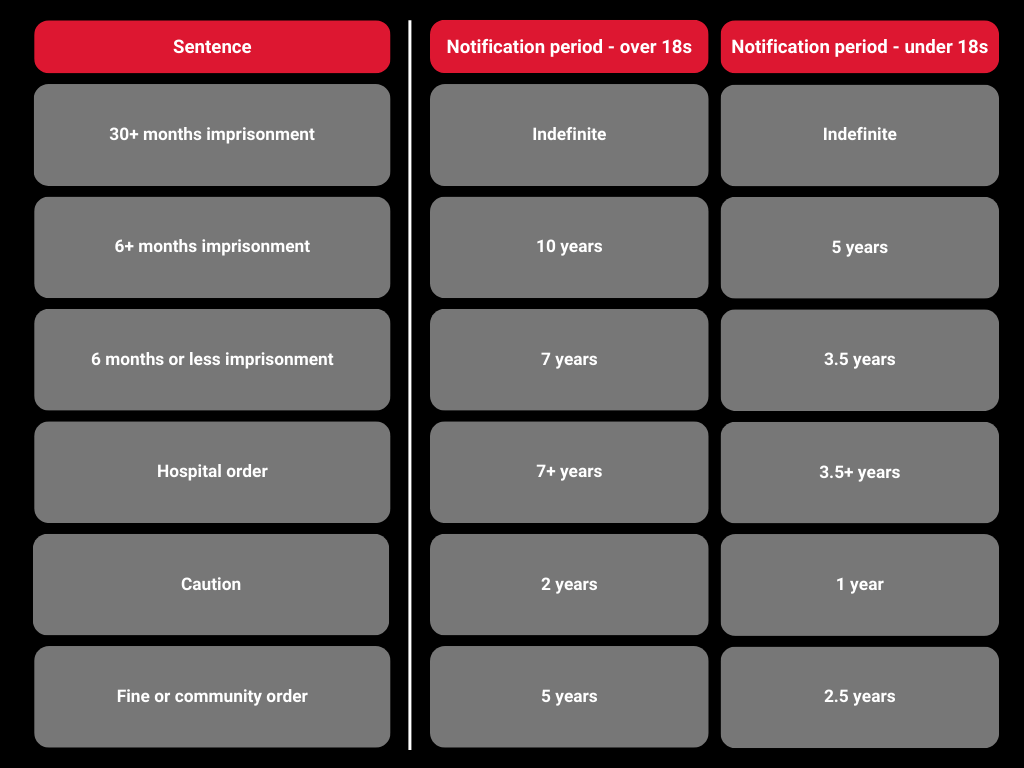In this article

Committing a sexual offence can lead to serious and long-term consequences, one of which is being required to sign in with the police as part of the sex offenders register. Facing charges for a sexual offence can drastically alter your life, which is particularly devastating if you are falsely accused.
Recent data shared by the government shows that there are over 68,000 people on the sex offenders register in England and Wales.
But what is the sex offenders register, how does your name end up on there, and what does it mean for the person registered?
In this blog, we uncover everything you need to know about the sex offenders register from the perspective of the accused and the convicted.
Looking to cut to the chase? If you need a solicitor to help you with a sexual offence allegation, just call us on 020 3007 5500, or submit a contact form.
What is the sex offenders register?
The sex offenders register is a government data collection scheme that gathers the details of cautioned and convicted sexual offenders.
It’s called a ‘register’ because the people cautioned or convicted must sign in with a police station as part of the notification requirements.
When you register, the police will collect your details including your name and any aliases, address, birth date, and national insurance number. During the notification process, you must provide updates about travel plans, bank details and updates to identification documents.
Is the sex offenders register public?
No. This is a database used by the authorities and is not accessible to the public. Online unofficial databases exist, but the government does not regulate them.
There are some circumstances where people with parental responsibility can request information from the police about whether someone is a registered child sex offender. This is known as the Child Sex Offender Disclosure Scheme, or Sarah’s Law.

Talk to us now. Save problems further down the line.
If you’ve been accused of a sexual offence you should speak to a solicitor right away.
Lines open 24/7

What offences get you on the sex offenders register?
Most crimes of a sexual nature require you to register as a sex offender upon caution or conviction.
Here are some examples of offences that can lead to sex offender registration:
- Indecent exposure
- Indecent images
- Rape
- Revenge porn
- Sexual assault
- Sex trafficking
- Voyeurism (watching or recording people for sexual gratification without their consent)
These apply to both adult and child victims.
How is a name added to the sex offenders register?
You must register at a designated police station within three days of your caution, conviction or prison release relating to a sexual offence.
Once you register, the police will have a duty to check the accuracy of the information you’ve provided. This can include home visits and identity checks.
What happens if I don’t register at the police station?
If you don’t register with the police when asked, you’ll commit another crime and potentially face more penalties.
How can being on the sex offenders register affect someone’s life?
The impact on your life will depend on who is notified of the offence and this is decided on a case-by-case basis. Your caseworkers will base their decisions on who to tell after they carry out a risk assessment.
The notification process
Once you are part of the sex offenders register, you will have a set of requirements to meet. These include:
- Renewing your registration annually
- Informing police of a change of address or change of name
- Notifying the police if you’ll be away from your registered address for 7+ days
- Alerting the police of any travel outside the UK
If you fail to disclose this information, you are committing a further criminal offence.
Your personal life
Whether you are innocent or guilty, a sexual offence conviction or being part of the sex offenders register can transform your personal life and massively impact your relationships.
Your family and friends may isolate you due to a lack of trust, especially if they have children.
Current and future partners may be notified of your status, which can change the dynamic of your relationship. You may even receive a ban from further intimate relationships if you’re placed on a Sexual Harm Prevention Order.
You may face restrictions or a ban from travelling outside of the UK, and you must disclose all travel plans away from home to the police, stripping you of any freedom or spontaneity.
It can be particularly complicated if you have children. Child Protective Services will likely intervene if you are living with, or have significant contact with a child. Depending on the nature of your offence and the deemed risk you pose, you may lose custody or visiting rights of your children to protect their welfare.
You might think “My friends and family won’t find out”. However, the police can visit your address as part of the notification process. The police can notify your family and friends of your offence if they feel it’s in their best interest.
If you’re worried about telling your loved ones, or the impact it may have on your relationships, this resource from Unlock could help you to navigate the conversation.
Your career
When a court convicts you of a crime, it can greatly impact your job prospects.
Some jobs require a DBS check to protect the welfare of the people you’re working with, such as children, vulnerable people etc.
Many employers enquire as to whether you have a criminal record, and you must legally disclose the truth. If your conviction is ‘spent’ e.g. your record is now clean, then you do not have to disclose past crimes.
Depending on the job type and the company, they may decline your application due to the information provided. For example, if you have a sexual offence conviction, you won’t be able to work at a school.
If you receive a criminal conviction while employed, you could even risk losing your current job. If your employer’s reputation or the safety of service users is in question due to your offence, then they may have grounds to dismiss you.
Facing a sexual offence conviction?
Don’t worry, we’re here to give the advice you need when you need it. Just contact us to arrange an appointment.
Lines open 24/7
020 3007 5500
How long does a name stay on the sex offenders register?
The length of time your name remains on the sex offenders register completely depends on the type of offence and your sentence.
Here is a table outlining the length of time:
Are you at risk of offending?
If you have committed a sexual offence or feel like you might be at risk to, you can reach out to the ‘Circles’ charity. They operate a country-wide support and accountability network to help you integrate into society safely and reduce the urge to offend.
How can you get your name removed from the sex offenders register?
Your name will no longer remain on the register once your sentence is complete, as long as there is no Sexual Harm Prevention Order in place.
If your name is on the register indefinitely, you can apply for a review after 15 years as an adult offender or 8 years as a young offender.
However, the acceptance of your application is not guaranteed.
Things the police consider when reviewing your application include:
- What your offence was
- How long ago you offended
- Whether you’ve reoffended
- The age of you and your victim at the time of the offence
- Your cooperation during the notification process
- Evidence of risk for further offence
If the authorities deny your removal application, you can appeal it in court, but you will not be eligible for legal aid.
What are the other legal consequences of being convicted of a sexual offence?
When you commit a sexual offence, you could face several other consequences.
Imprisonment
You may end up serving time in prison, depending on the seriousness of your offence.
The length of your sentence will determine how long you are on the sex offenders register.
Sexual Harm Prevention Order
The court may grant a Sexual Harm Prevention Order if they consider you as a risk to the public for a sexual offence. When a Sexual Harm Prevention Order is in place, you will have extra restrictions to prevent you from causing sexual harm to members of the public. This includes:
- Contacting previous victims
- Restricted/ regulated use of the internet
- No access to child facilities
- Prohibited to travel abroad
Hospitalisation
In some cases, the cause of a sexual offence is due to a mental health disorder. If applicable, the court may choose hospitalisation under a rehabilitation programme.
The hospitalisation route aims to address the mental health condition that led to someone offending. You will still need to register as a sex offender.
What happens when your name comes off the sex offenders register?
When your sentence is complete you no longer have to register as a sex offender or follow the notification process. Your name will no longer appear on the sex offenders register.
By this time, you can rehabilitate back into society, gain some more of your freedoms back, and plan ahead for your future.
However, you may still face prejudices due to your history. Some elements of life that could remain affected include:
- Broken down relationships
- Lack of trust from family and friends
- Involvement from Child Protective Services
- Travel restrictions depending on other countries’ rules
- Denied access to certain countries
- Job restrictions, such as working with children or vulnerable people
You may find that you don’t face any challenges at all.
How to avoid your name being added to the register
If someone has accused you of a sexual offence, it is important to seek legal representation as soon as possible.
A solicitor specialising in sexual offences can help you act in the best interest of your case from early on, ensuring you don’t incriminate yourself, representing you in police interviews, and investigating the grounds of the case – including submitted evidence.
Your solicitor will treat you with no pre-conceptions or judgment. They offer unbiased legal advice and explain all elements of the process to you, helping to provide clarity in what can be a very stressful time.
Having a solicitor on your case provides the best chance of proving your innocence and mitigating on your behalf to avoid or reduce the potential legal consequences.
If you have a sexual offence conviction, there is the option to appeal.
We understand the life-changing effects that come with the accusation of a sexual offence. If you, or someone you know, faces conviction for a sexual offence, our expert lawyers can assist you in fighting your case.
How can Britton and Time Solicitors help?
We know understand the life-changing impact of a sexual offence accusation. That’s why our initial consultations with our solicitors offer you:
- Unlimited time to go through the details of your case and ask any questions you may have
- An overview of your legal standpoint and your available options
- A precise time and fee estimate for your case
To arrange your initial consultation with one of our solicitors, simply call us on 020 3007 5500.






0 Comments